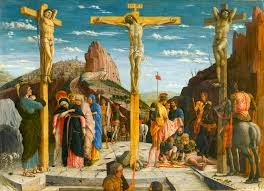Eighth Sunday in Ordinary Time
 |
| Aerial picture of the house that exploded |
As a chaplain with the Michigan State Police, much of my training has been for emergency situations. But, up to that point, I had never been on my own in the case of a real emergency. I always had Troopers who would take the lead, and I would try to assist them with what they said I needed to do.
After I saw, felt, and heard the house explode, I said, “Lord, have mercy!”, called 911 to give any information I had, and then rushed to get my State Police jacket on, find my flashlight, and run to see what had happened. As the fire engines from Flint Fire Department started to arrive on scene, I then started directing traffic so that emergency vehicles could get access to the scene.
Often, we don’t know what we will do unless we are tested. If we are wise, we make plans for disasters, or maybe we just daydream about scenarios where we are the hero, but until that situation arises in our life, it’s just theory. When life throws a situation at us where we need to react, we find out if our planning or our daydreaming was just wishful thinking, or if we really could respond in a heroic way to a life-changing event.
The same is true in our faith life. In order to find out our true physical strength, we have to test our muscles and put them under pressure. In order to find out our true spiritual strength, and what virtues we have, by the grace of God, cultivated in our life, we have to be in situations where we can choose virtue or we can choose vice. It doesn’t matter if we think we are a saint and we would never choose evil. Only when we are in a situation when we can choose either to do good or to do evil do we really learn how much we value following God’s way rather than our own, or the way of the world.
Take, for example, being put into a situation where we have done something wrong, maybe even something small, but someone notices and asks us if we are responsible. Maybe we even have friends around us to add to the situation with some peer pressure. When asked if we did something wrong, would we tell the truth, or would we lie? The lie may seem easier, and may, whether for a short or even a long time, keep us out of trouble. But we know that lying is wrong, a sin against God who is truth. So what do we do? It is so easy to fold under the pressure, and give in to what we think will be easier and cause less punishment for us. Maybe we even convince ourselves that it’s not that bad, or that we can do so much more good if we are allowed to lie in just this one case. But, of course, if we start to lie now, we are more likely to lie later. And a basic principle of morality is that you cannot do evil to achieve a good: it makes the whole scenario evil.
In the upcoming forty days of Lent, we will test our spiritual muscles out again. Our acts of prayer, fasting, and almsgiving (or the lack thereof) will tell us exactly what kind of fruit our life of grace has borne thus far. When faced with a spiritual struggle, our true mettle comes out, what we are made of, and we learn where we need to grow in following Christ. God reveals to us our shortcomings, not to beat us up with them, but to help us to know the ways in which we need to open ourselves to His grace to be better followers of Christ. God gives us this special time to turn away from sin and be faithful to the Gospel so that we can rejoice even more in the new life that Christ won by His Passion, Death, and Resurrection, and live that new life ourselves.
Our catechumens who will be sent today by us to the Rite of Election, will also be tested in these weeks of Lent. In the scrutinies, the Church will ask them to review their own life and put behind them all that does not conform to Christ. They will reflect on how much their thirst for the new life Christ gives; on the areas of their life in which they are blind to sin; on the death that sin has caused in their lives. But it won’t end there, just as Good Friday is not the end of the story.
Because God wants to help us through these trials. We cannot grow in holiness on our own. Without God’s grace, we have no chance to live a holy life. So as we grow in awareness through our trials, don’t be afraid to call upon God and ask for the help that we each need to live the new life of Christ.
Until we are tested, we don’t really know how we would react. May these upcoming Lenten days test us, show us our shortcomings, and open us to the grace and mercy of God who strengthens us to follow Christ on his pilgrimage through the desert. May we allow God’s grace to make us bear good fruit as we remove the splinters of sin from our lives.


















